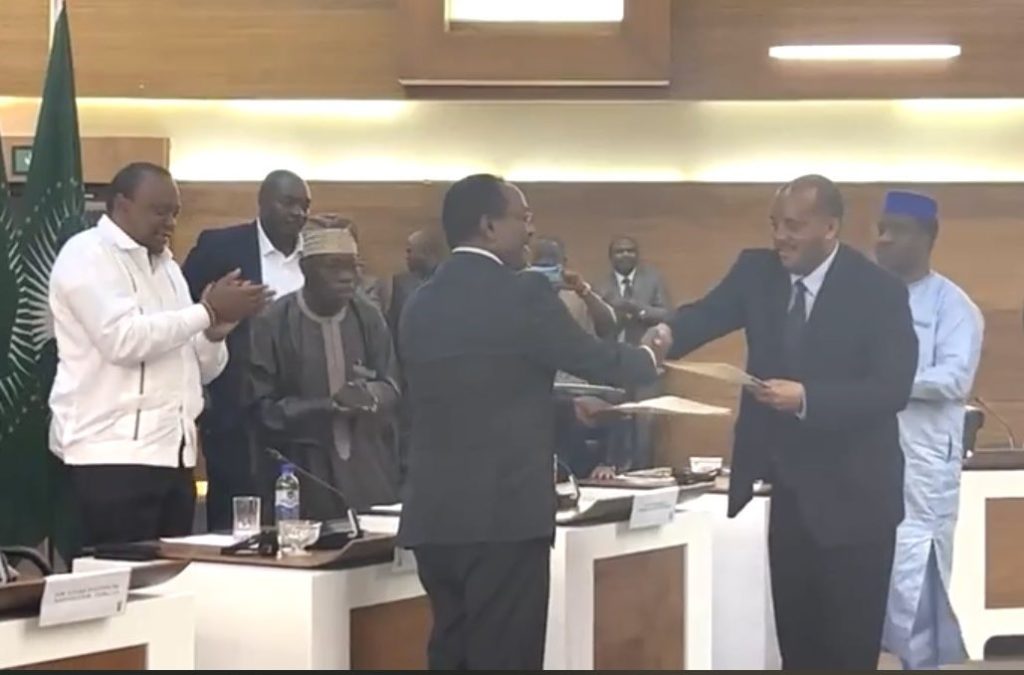Highlight 10/2023 – Regional conflicts resolved through regional organizations
Buba Gedo Boke, 2 March 2023

Regional and sub-regional organizations play an important role in the peaceful settlement of disputes. In accordance with, Article 52 of the UN Charter, the Security Council should encourage the peaceful settlement of local disputes through regional organizations and may refer such disputes to them. Today, there are different regional conflicts, namely the Russia-Ukraine, the Horn of Africa, Syria, Yemen, Libya, Chad, Mali, Sudan, the Central African Republic, the Republic of Congo, Burkina Faso, and the Israeli-Palestinian conflict. These conflicts are primarily expected to be managed by the states themselves or regional and sub-regional organizations. Some of the regional intergovernmental organizations expected to manage the regional disputes and conflicts are the European Union, Africa Union, League of Arab States, Pacific Island Forum, the Association of Southeast Asian Nations and the Caribbean Community. Having regard to the African region, the Peace & Security Council (PSC) is the main body of the Africa Union charged with promoting peace and security on the continent. It is the standing decision-making organ of the African Union for the prevention, management, and resolution of conflicts. When considering the conflict situations in the region and over the years, as well as the peace processes advanced, the principle of “African solutions to African problems” has been the priority and has recently been applied in Ethiopia.
After assuming office as Ethiopia’s Prime Minister in April 2018, Abiy Ahmed pledged to undertake a series of reforms marking a significant path to democracy, including reviewing the country’s anti-terrorist and civil society laws. A single ruling party, the Prosperity Party (PP), was created to replace the Ethiopian Peoples’ Revolutionary Democratic Front (EPRDF), the coalition of the four main ethnically based parties, governing since 1991. Three of the four EPRDF parties merged into the PP, as did regional parties that had not been involved in previous national governments. However, the Tigray People’s Liberation Front (TPLF), which had long been the leading party in the EPRDF, decided not to merge with the PP. The new government freed thousands of political prisoners and granted amnesty to rebel armed groups, including the Oromo Liberation Front and Patriotic Ginbot 7. Prime Minister Abiy Ahmed also signed an agreement with Eritrea putting an end to a two-decade boundary dispute. These multidiscipline democratic reforms in Ethiopia and the Horn of Africa moves won Prime Minister Abiy Ahmed the Noble Peace Prize 2019. In 2020, Ethiopia’s federal parliament approved the government’s decision to postpone national elections planned for August until the end of the pandemic and extended the Prime Minister’s mandate. In violation of the order, the Tigray regional government held a regional election in September 2020.
Moreover, on3 November 2020, the Tigray People’s Liberation Front (TPLF) launched attacks on the Ethiopian National Defense Force (ENDF) Northern Command headquarters. On the same day, 3 November 2020, Prime Minister Abiy Ahmed ordered a military offensive against TPLF forces, to save and protect the unity and sovereignty of Ethiopia. The federal government declared a state of emergency in the region and appointed an interim administration of Tigray. Despite declarations by federal representatives that the situation was under control at the end of November 2020. However, after the Federal government left the regions, the TPLF force and the conflict escalated into the Tigray neighbor’s region with devastating and dire humanitarian consequences on both sides.
After a devastating two years of war, the Ethiopian government and TPLF entered peace talks on 25 October 2022 in Pretoria (South Africa). The African Union’s High Representative for the Horn of Africa, Olusegun Obasanjo (former Nigeria President) and Uhuru Kenyatta (Former Kenya President), mediated the talks, with observers from the East African Intergovernmental Authority on Development (IGAD), the United Nations (UN) and the United States of America. The “Cessation of Hostilities Agreement between the Government of the Federal Democratic Republic of Ethiopia and the Tigray Peoples’ Liberation Front (TPLF)” peace agreement was signed on 2 November 2022 in Pretoria, South Africa. Complemented by implementing modalities agreed upon on 12 November 2022 in Nairobi, Kenya. Key points of the peace agreement and the implementing modalities include the permanent cessation of hostilities, the disengagement of forces or armed groups under federal and TPLF control, the cessation of hostile propaganda, and disarmament, demobilization, and reintegration (DDR), and affirming that the Federal Democratic Republic of Ethiopia has only one defense force. The peace agreement envisaged the overall disarmament of TPLF combatants within 30 days of its signing. However, the implementing modalities state that the disarmament of TPLF heavy weapons will be done concurrently with the withdrawal of other forces in the Tigray region.
Since the Ethiopian government and the TPLF agreed, the situation in the northern part of Ethiopia has immensely changed with the TPLF’s return to constitutional order. As a result, Prime Minister Abiy Ahmed has met the negotiators and leaders of the TPLF for the first time since the devastating two-year war and discussed with them how to enhance humanitarian aid and to reopen basic public services in the region. The Pretoria Peace Accord between the Ethiopian Government and the TPLF has led to the silencing of guns in the northern part of Ethiopia. In assessing the principle of “African solutions to African problems” as in the case of Ethiopia, it is apparent that conflicts resolved through the interventions of regional organizations reduces the burden on the UN system, particularly the Security Council, and should be the primary responsibility and course of action for other regional and sub-regional organizations facing similar challenges.
Buba Gedo Boke, Highlight 10/2023 – Regional conflicts resolved through regional organizations, 2 March 2023, available at www.meig.ch
The views expressed in the MEIG Highlights are personal to the authors and neither reflect the positions of the MEIG Programme nor those of the University of Geneva.
